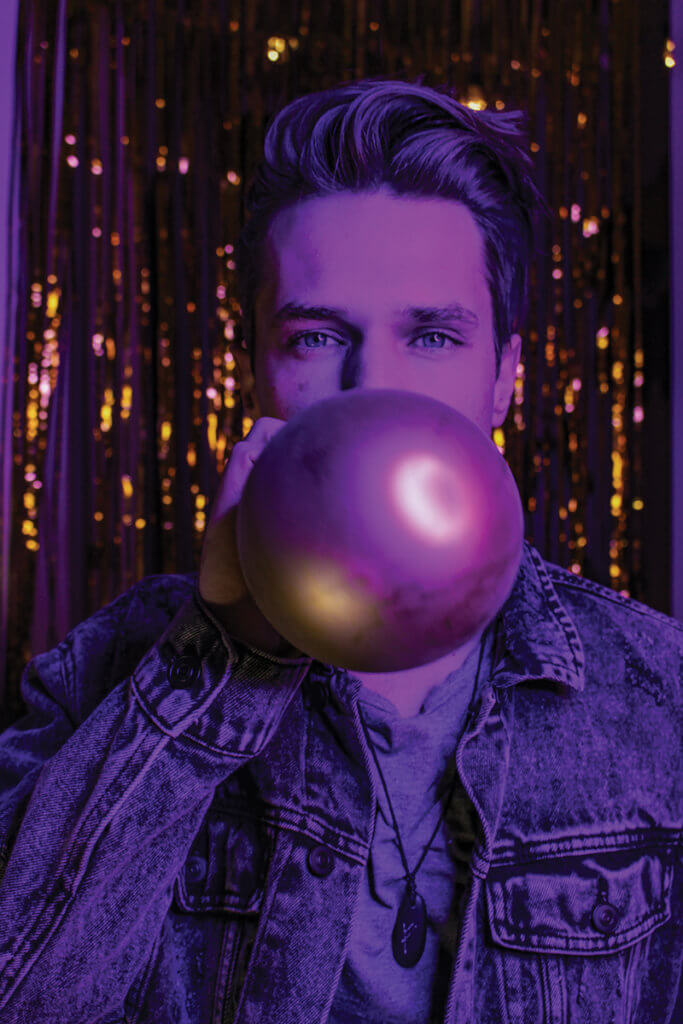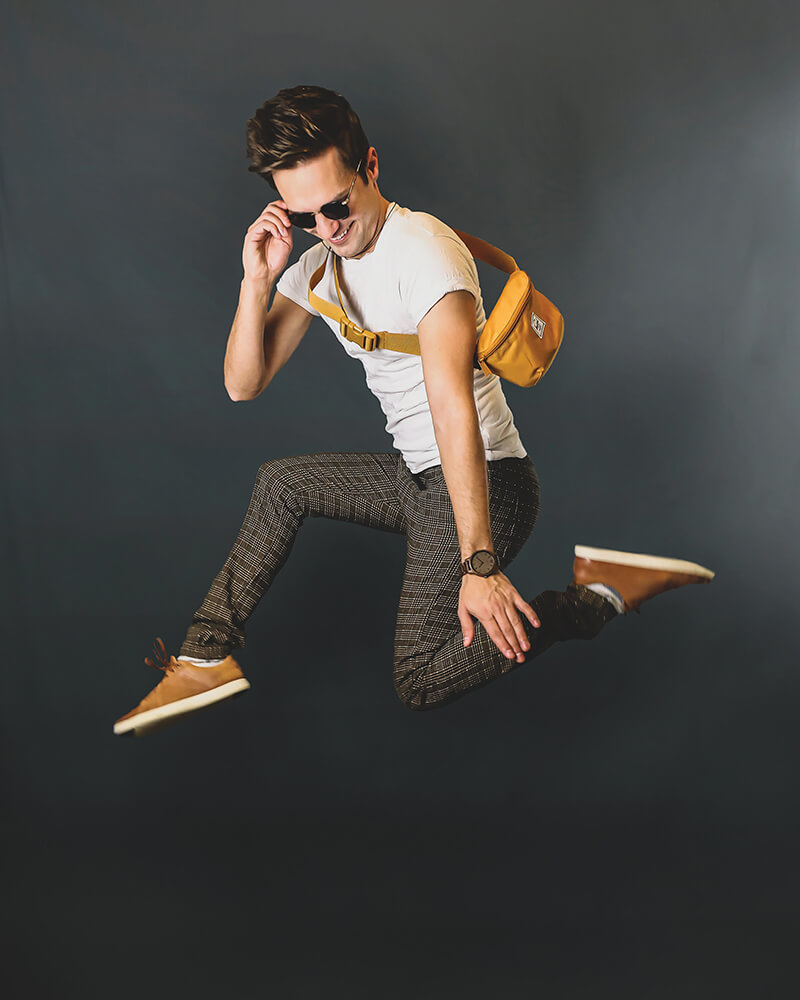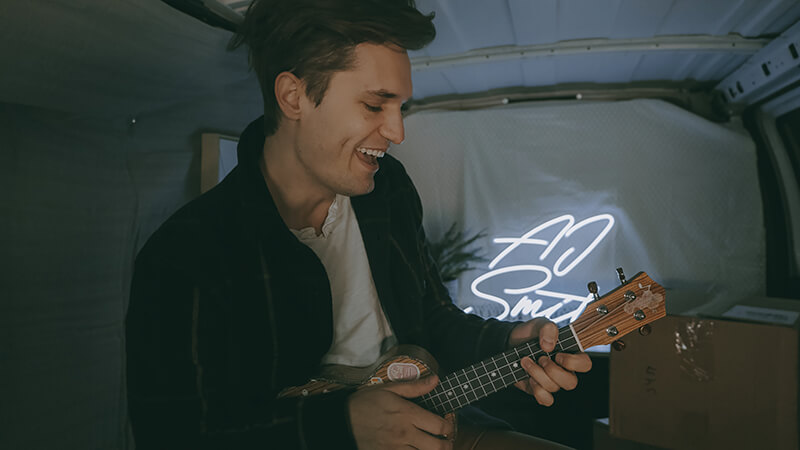AJ Smith is jack of all trades, and well, a master of them all, too. Starting off his professional career on an engineering path, he found himself pursuing music and songwriting (and thank goodness, because we’d be missing out on one of this generation’s best talents).
We recently had an opportunity to work with AJ as part of our Elixir Strings ‘artist of the month’ program, and loved the videos he participated in so much that we just had to sit down and learn more about him. Presented here is a portion of that interview — we hope you enjoy.
Let’s take it back – you were born in the shadows of the Rocky Mountains, right?
Yeah, right outside of Denver.
Did you have a musical upbringing?
My godmother taught lessons –it’s this whole story, I ran away from home, as they say. I snuck out while my mom was in the shower and took the family dog down to my godmother’s house. I would sit in the window well and listen to the piano lessons that she was teaching, like two houses down. And my parents would be freaking out, like ‘Where’s our kid?’ and that’s where I was [laughs]. A few 911 calls later…
How old were you?
Three [laughs]. They make better child-proof locks now.
So that’s your first exposure to music?
Yeah, and we had a family piano that was upright, in the house. I was fascinated by it…and my godmother started teaching me, which was awesome. And my parents took me to see a show – Yanni was performing at Red Rocks, it was the first concert they took me to. I was like five. So, I got to go see Yanni, and there was a violinist there and I was like, ‘Mom, can I please play the violin?’ you know…as a kid who has no concept of how much things cost. [laughs]

My mom was like, [quietly] ‘We’ll figure it out, I guess.’ And they did, which was awesome. I’m really lucky to have parents who were able to make it happen for me, in terms of getting me some instruction as a kid.
I went to summer camp a few years later and I had saved up all my lawnmowing money and brought it with me…It was like $150 but it felt like I was the world’s richest man, and I blew all my money on an acoustic guitar.
Well, it’s a good thing to spend money on when you’re a kid, I suppose.
Oh, yeah.
So, at this point, you’re already into piano, violin, and guitar. Nowadays, you’re up to almost a dozen instruments or so. Just you just keep accumulating talent over the years? [laughs]
[laughs] Yeah, especially with stringed instruments. Once you know one, it’s quite quick to learn another and get good at it. Violin is probably one of the harder ones, the bowed-stinged instruments, so going from that to a fretted instrument like a mandolin…it’s the same tuning but it’s fretted, so it’s way more forgiving in terms of intonation. So, then it’s just a matter of figuring out picking technique and things like that.
At a certain point, you took a less musical path and entered the world of engineering. Can you walk us through that, as well? It’s interesting because I think they’d work different parts of the brain…
Music is very creative, engineering can be creative. Music can also be very analytical.
In high school I got this internship with the U.S. Navy Research Lab, working there with infrared sensors. I had been doing computer programing on my calculator so I would program games on there for me and my friends. That way when I was in class we could be playing games instead of paying attention [laughs].

From there I applied for the internship and simultaneously I was also a young associate to the National Symphony Orchestra, so it wasn’t like I forgot one path while pursuing the other — they were both in D.C., so I could go from one to the other.
So, I worked at the research lab and wrote some algos that were used for years. Which was pretty cool.
When do you decide to go for music full time?
I still do code and program my own Ableton rig set, but the choice [to do music] was kind of interesting. It was the West Side Story orchestral suites that were pivotal in the decision for me. I was playing at the Kennedy Center, and we were playing the suites and gets to the part musically where it’s just beautiful, stunning, it’s one of my favorite pieces of music. And I’m thinking, ‘Do I go to NYU to study music, or do I got to Johns Hopkins in Baltimore to study engineering?’ I felt like I was getting pulled in two different directions.
Weirdly enough, I didn’t get into the Peabody Conservatory for composition, there were going to have me do it for violin performance. But that’s not really what I wanted to do. I wanted to write music. So, I was sitting up on that stage while playing and pretty much started crying when we got to that part of the song, it was like a moment of clarity for me, like how could I ever give this up? I have songs in my head that I want to get out into the world that have been entrusted to me as a creative by whatever in the universe. I felt like I had to do it.
Up until that point, you were really a performer. So, when did the songwriting enter the picture?
If I’m being completely honest, I wrote a lot of songs but didn’t realize songwriting could be a path or career. And also, I was a little afraid to tell my parents that I wanted to become a songwriter or rock star…the classical direction felt safe. ‘Oh, I’m going to school to study film scoring.’ That felt like a direction.
But I knew then that’s not what I wanted to do, I was faking it to myself to make my parents happy, while still fulfilling some sort of creative career. It wasn’t until my junior year at NYU when I was playing a song for one of my film scoring assignments, it was supposed to be a standard, not an orchestral piece. And my professor was like, ‘Maybe you should take the songwriting class next semester. I feel like this is more [for you.]’ I ended up taking his advice, and it completely changed my life.

A semester after that, Glenn Frey’s daughter went to NYU, and he stopped by the songwriting department, and he came and talked to one of my professors and he would come in to listen to students’ songs. He became sort of an adjunct professor for songwriting, which was the coolest experience to have. He heard a couple of us, and took us under his wing, worked with us in the studio, and invited me to open for The Eagles. He was just an awesome mentor and taught me a lot about songwriting.
That’s got to be a major validation for you…
When you get somebody who’s done a lot of awesome stuff, and they go, ‘Oh, that’s awesome.’ It means more than…you know, I struggle with ‘imposter syndrome’ as much as anybody. Having that and the mentorship to come out of it was more than just validation.
[editor’s note – it was at this point that I, as the interviewer, went on a long rant that was tangentially related to the conversation, buy wholly uninteresting to you, the reader. We’ll pick it up a few moments later…]
Where are you at today with AJ Smith, the musician/songwriter?
I spent the first part of the pandemic livestreaming every day or every week, so I got kinda streamed out pretty early. I kept it up for a long time, and I felt like I was playing all these songs I was writing, but not releasing them because I wanted to wait until I could tour. But I ended up putting out a song anyways, called ‘Billy Joel,’ which caught the attention of the real Billy Joel. He liked it, and wrote to me and everything, and mentioned the possibility of opening for him when live music opens back up, which would be amazing.
Now that everyone’s getting vaccinated, it seems like it’s coming back, but until I’m on that stage, I’m gonna knock on wood [laughs].
OK, so you’ve got the Eagles and Billy Joel on board as cheerleaders. Are you gonna shoot for McCartney next, or what? [laughs]
That would be awesome, too. I’ll take all of it! [laughs]
